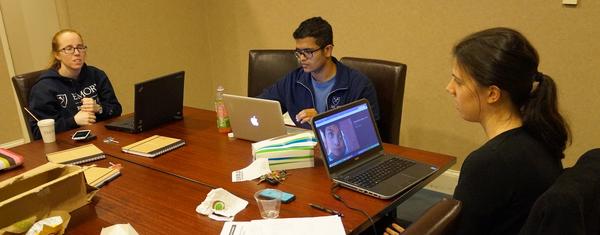Emory Hosts Competition To Solve Global Health Issues, Gun Violence
 An audio version of this story
An audio version of this story
“¡Alto a la Violencia!” (“Stop the Violence!”) reads the prompt that 24 teams of students from across the U.S. and the globe had to work out this weekend at Emory University’s Global Health Case Competition.
The competition, now in its fifth year, includes undergraduate, graduate and professional school students from a variety of disciplines. Teams had less than a week to pore over a pre-written scenario and tease out important facts. On Friday, they gathered at Emory to strategize and present to a panel of judges how best to handle a global health threat.
Although it’s a global health competition, organizers wanted students from multiple disciplines to participate.
“A health person might not think of the legal issues or might not think of the religious issues,” says Robert Breiman, director of the Emory Global Health Institute.
Breiman says the competition builds skills that are directly applicable in the real world.
This year’s topic ─ how to reduce gun violence in Honduras ─ took participant Benjamin Ebeling aback. 
“We did not know anything about Honduras at all,” says Ebeling, a medical student at the University of Copenhagen.
Instead, he and his team thought they might tackle a topic like noncommunicable diseases or Ebola.
After intense discussion, including time with case-matter experts, the University of Copenhagen team presented a comprehensive attack plan to a panel of judges.
But the team’s approach wasn’t enough to propel members into the final round.
Top honors this year went to the University of California at Berkeley, whose members went home with a $6,000 prize.
(To see video presentations from the top four case competition finalists, click here.)
9(MDAxODM0MDY4MDEyMTY4NDA3MzI3YjkzMw004))






